Love those letters
« previous post | next post »
Here we go again. More Roman letters and English words on police and security guard uniforms in China (see below for some earlier posts). Here's a doozy:
I suspect that only an infinitesimal number of people on the planet would be able to figure out what "CNFJ" on the back of this officer's vest stands for (no, it's not "Commander, U.S. Naval Forces Japan"). I'm guessing that it means:
Chángníng fújǐng 长宁服警 ("Changning service police"), or maybe the FJ is for fǔjǐng 辅 警 ("auxiliary police")
Changning is the name of a district in Shanghai where this photograph was taken. It would be pronounced Zan1nyin1 in Shanghainese.
In the following portfolio, we see a variety of police and security guards identified solely in English or in a combination of English and Chinese.
tèjǐng 特警 ("special police")
jǐngchá 警察 ("police")
Lónghuá jīxùn 龙华机训 ("Longhua machine training") — Longhua is a subdistrict of Shenzhen; "machine training" refers to familiarizing the public with the use of various types of bomb detection apparatuses.
Paul Midler remarks:
We see the uniforms getting a more standard, better look, while there remains no real standardization of terminology and language usage. I think the biggest point can be made with the word SECURITY. Most people in China (Shenzhen here) don’t readily read English. Chinese understand this person is important or powerful because of the English lettering alone? Martin Jacques, in When China Rules the World: The End of the Western World and the Birth of a New Global Order, promised us that we would all be speaking Mandarin! This is hardly the case it seems. I don’t ever see the world learning Mandarin.
Ticket machines in a train station:
For CRH, I sort of guessed "China Railway High-speed".
"Again", asks Paul, "where has Martin Jacques gone? Where’s all that Middle Kingdom jingoism? China’s rise was supposed to make us all speak Mandarin! Their high-speed rail is most popularly known by three English letters—CRH?"
Finally, on the ubiquitousness of Roman letters and English names and words, Paul quotes the following passage (see especially the second paragraph below) from his recently published book, What's Wrong with China?:
In this particular regard, I don't think anything is wrong with China. I think that China has simply "opened up" (kāifàng 開放), as Deng Xiaoping advocated four decades ago. As we are keenly aware, attitudes towards foreign languages — English in particular — can serve as a bellwether for predicting changes toward foreign cultures and countries that may be in the offing. So long as the communist authorities do not radically and ruthlessly prohibit the use and spread of the Roman alphabet and English language — no matter what their rhetoric concerning them might be — it means that they are essentially following a policy of linguistic laissez-faire with regard to the Roman alphabet and the English language (which is not what they are doing vis-à-vis, say, Cantonese, Tibetan, Uyghur, and Mongolian).
Readings
- "Proliferating police" (6/28/18)
- "Special diligence: police and security forces in China" (4/14/18) — with multiple photographs and long lists of names for different types of police
- "'Suffered We Protect They'" (12/22/14)
- "Pinyin in practice" (10/13/11)
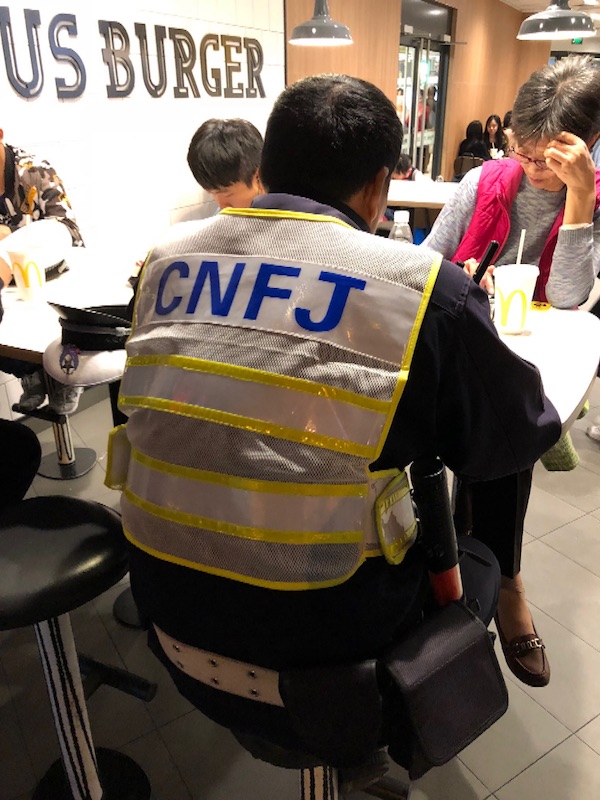


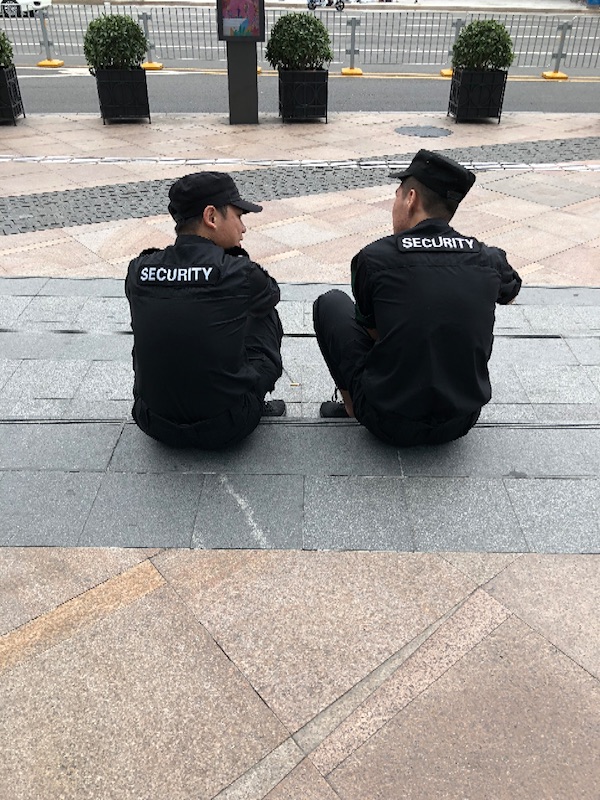
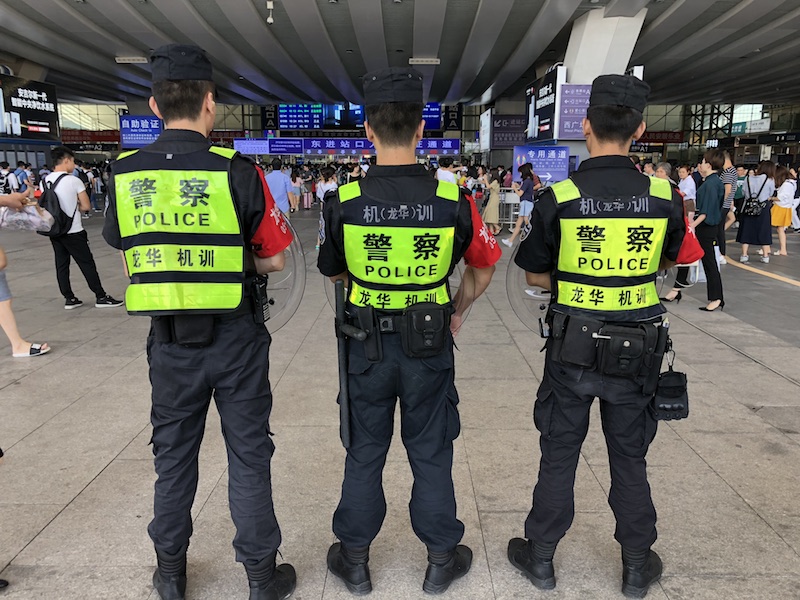
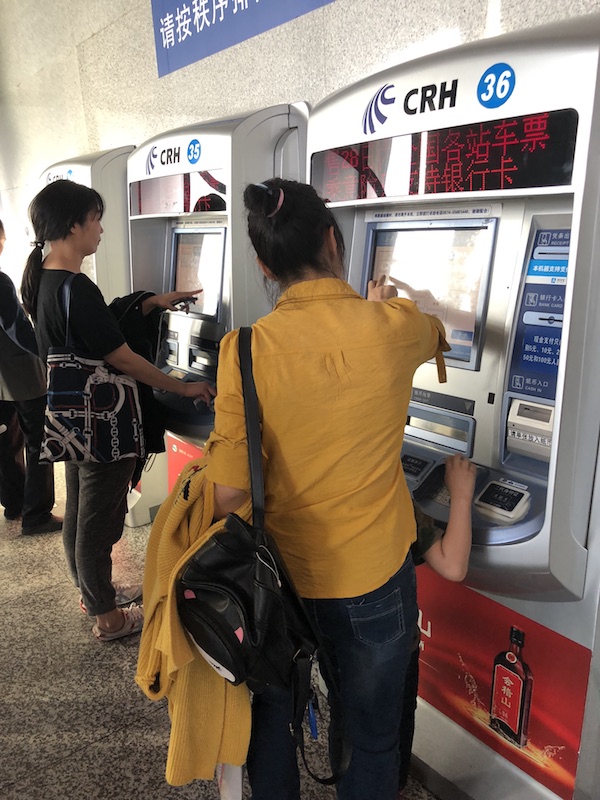
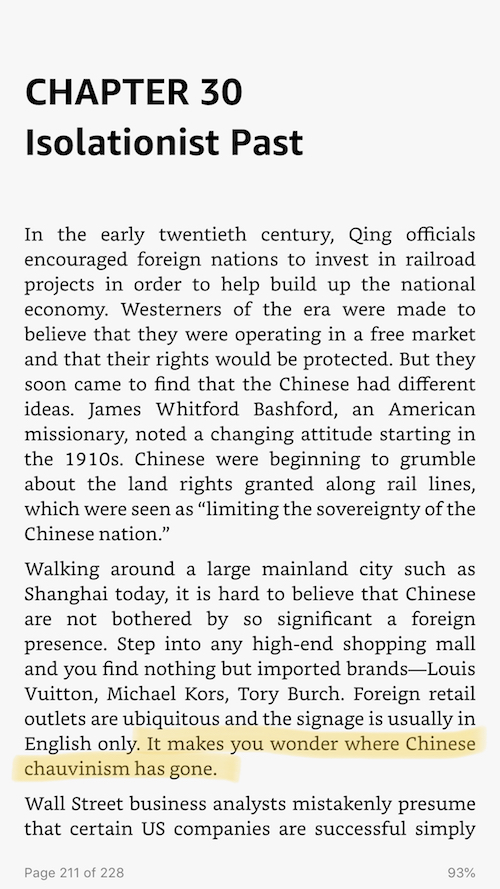
Philip Taylor said,
November 4, 2018 @ 3:56 am
"Step into any high-end shopping mall and you will find nothing but imported brands — Louis Vuiton, Michael Kors, Tony Burch". Are these really imported, or are they mass-produced in China and then sold at grossly-inflated prices because of the perceived cachet of the name ?
David Marjanović said,
November 4, 2018 @ 6:41 am
Well, the brand is imported, along with its prestige – even if none of the actual items may be.
nn said,
November 4, 2018 @ 7:16 am
What about the US BURGER in the background of the first photo? Where in Shanghai is that place?
Philip Taylor said,
November 4, 2018 @ 8:08 am
My suspicion is that, in this context, "US" are merely the final letters of some longer name. Rather as while "CNFJ" might reasonably be interpreted as possibly representing "Commander, Naval Forces Japan" I see no justification for interpolating an additional "U.S." there …
Philip Taylor said,
November 4, 2018 @ 8:16 am
"ANGUS BURGER" being one attested possibility …
Jason Mills said,
November 4, 2018 @ 8:24 am
Some context, as it were, for those who might not be aware: though most Chinese may not read much English, they are quite familiar with Roman letters and, especially, with romanization of their words. For example, as part of my ongoing learning, I bought a book for young students in Hefei recently. It was one of dozens with texts in Chinese characters, each of which was also represented underneath in Romanized (pinyin) form. Also, as discussed not infrequently here on LL, Chinese commonly text by typing in the Roman letters for Chinese words which are then converted by software into characters.
So acronymizing Chinese “changning fujing” would not be a stretch or require a dictionary or translator or love of/education in English, etc. for whomever designed this vest. And it might make a lot more intuitive sense to Chinese seeing it at a burger joint (whether they have any English knowledge at all) than to non-Chinese. But I haven’t collected any data from Chinese acquaintances to support this hypothesis….
Jason M said,
November 4, 2018 @ 8:40 am
Either the server is really slow, or my original post was eaten.
I had been adding context, as it were, for folks who may not realize that Chinese grow up learning their characters in conjunction with Romanization (pinyin) of their characters and can use a Latin letter system when texting on their phones (whose software then converts to characters) as discussed not infrequently here on LL.
So acronymizing “changning fujing” would not be a stretch or require a dictionary or translator or love of/education in English, etc. for whomever designed it. In fact, those people seeing it at this Golden Arches in Shanghai (you can see the logo on the cups) might more intuitively guess what the letters stood for than non-Chinese would.
Not to take away, of course, from Victor’s ongoing wonder at why the need to put the Romanized acronym rather than the Chinese characters in the first place, which is clearly a different issue….
Dave Cragin said,
November 4, 2018 @ 2:14 pm
In Beijing, I interact with many people who participate in the international speaking & leadership organization called Toastmasters. Virtually all are Chinese and they have variable levels of English ability.
They often use English abbreviations for various Toastmasters terms, despite that Chinese equivalents for the words exist. One referred to herself as "IPP" and I couldn't guess its meaning. She said "Immediate Past President." Or "TTT" for Train The Trainer; another abbreviation I couldn't guess. They also often refer to their club names via its English abbreviation despite that their clubs normally also have an equivalent Chinese name.
I'm mentioning the above because it's totally spontaneous. Their is no government or organization saying which language to use. Clubs are run by volunteers and the volunteers pick the language & abbreviations. They could use Chinese, English or both. Most employ a mix and to use Victor's phrase, their word choice is laissez-faire.
(For those who participate in Toastmasters and speak some Chinese, I highly recommend visiting a club while in China. It's a remarkably fun language experience).
Jerry said,
November 4, 2018 @ 4:51 pm
Chinese love acronyms because they are condensed symbols that represent a larger idea—just like the ideographs in mandarin.
They use acronyms for jokes…
BMW=别摸我 (ie, don’t touch my car)
MBA=Married but available
They howl with laughter, and the draw there is the abbreviation.
Michael Watts said,
November 4, 2018 @ 7:47 pm
I've seen two other ways for Chinese to think about BMW.
One is to refer to the cars as bao-ma, 宝马. The W gets lost.
The other is the idea that what BMW really stands for is Be My Wife.
Jason M said,
November 5, 2018 @ 7:38 am
In re: Chinese love for acronyms, a couple of years ago, my wife and I were being escorted by a graduate student around Shenzhen. The student was in constant contact with the organizers of the conference my wife was speaking in. Occasionally, she would ask whether my wife’s P P T was done to be uploaded. She also magically had nice cars appear to take us to each destination She explained h cars were nt conjured but simply the result her A P P. And the cars were so nice because we were V I Ps. We felt pretty stupid once we figured out the pattern, though in fairness to ourselves, APP is not an acronym.
Jim said,
November 6, 2018 @ 12:38 pm
I figured CNFJ was his Meyers-Briggs code.
Kaleberg said,
November 6, 2018 @ 11:22 pm
A truly dominant language seizes words, phrases, even grammatical forms and makes them its own. England ruled the world, and its lexicographers boasted of the linguistic spoils of empire. Only the language of a conqueror could produce the sprawling monstrosity that is the OED. Double points for horribly mispronouncing one's prizes in their annexed form.
Michael Watts said,
November 8, 2018 @ 6:39 pm
PPT is also not an acronym; it's just the file extension for PowerPoint documents.
Jason M said,
November 9, 2018 @ 9:13 am
@Michael Watts- maybe I wasn’t clear. I had been trying to find an acronym that fit A P P and P P T parallelling V I P but couldn’t. Eventually I figured it out (ie that they weren’t acronyms), but I guess a lot of humor rings wrong when one’s mind is excited by the chance to potentially post a pedantic point.